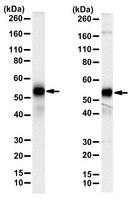06-340-I-25UL Sigma-AldrichAnti-c-Myc
Anti-c-Myc , Cat. No. 06-340-I, is a rabbit polyclonal antibody that detects c-Myc and is tested for use in Immunocytochemistry and Western Blotting.
More>> Anti-c-Myc , Cat. No. 06-340-I, is a rabbit polyclonal antibody that detects c-Myc and is tested for use in Immunocytochemistry and Western Blotting. Less<<Recommended Products
概述
| Replacement Information |
|---|
| References |
|---|
| Product Information | |
|---|---|
| Format | Purified |
| Presentation | Purified rabbit polyclonal antibody in buffer containing 0.1 M Tris-Glycine (pH 7.4), 150 mM NaCl with 0.05% sodium azide |
| Quality Level | MQ200 |
| Physicochemical Information |
|---|
| Dimensions |
|---|
| Materials Information |
|---|
| Toxicological Information |
|---|
| Safety Information according to GHS |
|---|
| Safety Information |
|---|
| Storage and Shipping Information | |
|---|---|
| Storage Conditions | Recommend storage at +2°C to +8°C. For long term storage antibodies can be kept at -20°C. Avoid repeated freeze-thaws. |
| Packaging Information | |
|---|---|
| Material Size | 25 µL |
| Transport Information |
|---|
| Supplemental Information |
|---|
| Specifications |
|---|
| Global Trade Item Number | |
|---|---|
| 产品目录编号 | GTIN |
| 06-340-I-25UL | 04065267463704 |
Documentation
Anti-c-Myc MSDS
| 职位 |
|---|
Anti-c-Myc 分析证书
| 标题 | 批号 |
|---|---|
| Anti-c-Myc - Q3792259 | Q3792259 |








